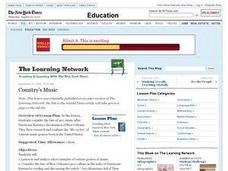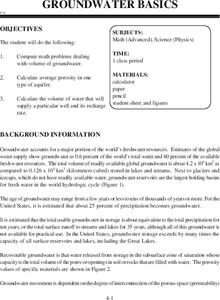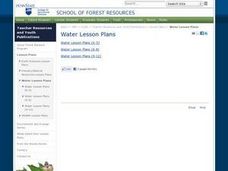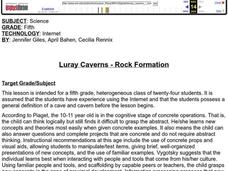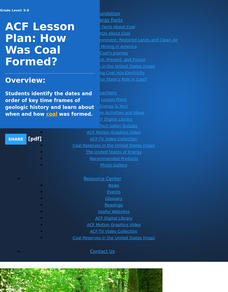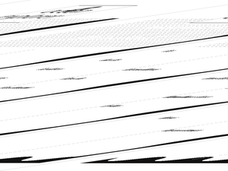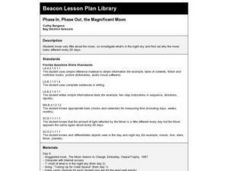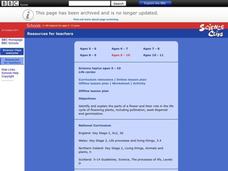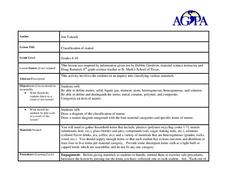Curated OER
What Is Natural?
Your junior highers will learn about which objects are natural and classify objects as abiotic or biotic. Your class will trace human products to their natural resources using matter cycles and then create their own definition of nature.
Curated OER
Country's Music
Jazz, Blue Grass, Hip Hop, Swing. Gospel, R&B, Ragtime, Disco. So many music genres born in the USA. After reading an article about the fate of New Orlean's Jazz after Hurricane Katrina, class members investigate the life cycles of...
Curated OER
Groundwater Basics
Groundwater is an essential natural resource, not to mention a fascinating topic to study. Here is a series of twelve amazing lessons on the water source and how we use it in our daily lives. Concepts require higher math and physics...
Curated OER
Regolith Formation
Students study what regolith is and how it contrasts with weathering on Earth. In this weathering instructional activity students divide into groups, hypothesize and confirm their guesses.
Curated OER
Layer By Layer
Have your class learn about the formation of the Grand Canyon using this lesson. After listening to a variety of stories about the Grand Canyon and erosion, learners complete worksheets related to the geology of this area. What a...
Curated OER
"Pennsylvania Watersheds, Many Ways to the Sea"
Students trace a molecule of water through the water cycle including each of its three loops. They describe why evapotranspiration demands the largest portion of total precipitation falling on a forested watershed.
Curated OER
Luray Caverns - Rock Formation
Fifth graders conduct research on the geological formation Luray Caverns located in Luray, Virginia in preparation for a field trip to the caverns. They conduct Internet research, and answer worksheet discussion questions.
Curated OER
Soil Investigations
Learners examine the basics about soil. In this soil lesson students describe the physical properties of soil and explain what soil profile is.
Curated OER
How Was Coal Formed?
Geology can be a lot of fun. Learners review geology related vocabulary, make flashcards, use encyclopedias to answer questions, then explore the formation of coal. They identify dates and order them into key time frames of geologic...
Curated OER
Chemistry: Changing Materials
Students examine physical change with different temperature and solvents. In this elements and compounds lesson, students conduct experiments to discover what happens to the mass of a substance when is undergoes a physical change.
Curated OER
What is a Karst
Students investigate landforms by holding a class experiment. In this topography lesson, students define the word "karst" and discover why sinkholes are created on the surface of the Earth by completing worksheets. Students create a...
Curated OER
Wipe Out
Learners examine the flow of water. They observe and test the properties of water by using sticks in flowing water. The lesson has streaming video, resource links to access, and a good hands-on activity that is clearly described in the...
BBC
Sound and Hearing
First and second graders recognize that sound is generated in a variety of ways, and that it comes from many different sources. They explore tone and volume, realizing that there are different ways to describe sound. Some musical...
BBC
Light and Shadows
Light is such an amazing thing! Elementary schoolers explore the wonderful world of light and shadow. The lesson is meant to be carried out on a whiteboard. Objects are placed in front of a light source, and learners must predict what...
Curated OER
Changing State
Learners identify the changing states of water, water vapor and ice in the water cycle They investigate how each of these stages can be reversible. Students complete a worksheet describing the water cycle.
Curated OER
Phase In, Phase Out, the Magnificent Moon
First graders discuss why the moon appears to change shape. They use flashlights and balls to simulate the sun's light shining on the moon during its different phases. They read books, paint pictures and write sentences about the moon.
Curated OER
Fieldwork: Horizons Under Ground: Digging Through Wetland Soil
Young scholars study the different soil types and describe the different soils in various environments. In this soil lesson students walk to a reserve and discuss what they saw.
Curated OER
Life cycles
Students identify and explain the parts of a flower and their role in the life cycle of flowering plants, including pollination, seed dispersal, and germination. Students recap the following information: that plants need light, warmth,...
Curated OER
3rd Rock from the Sun's Baby Rock
Seventh graders have a chance to actively see each phase of the moon and make connections to what they see in the sky when you show how the moon goes through each of the phases.
Curated OER
Global Change — Change and Cycles Where Land, Air and Water Meet
Students participate in an experiment to define a parts-per-billion solution. For this ecology lesson, students select a second substance to create a parts-per-billion solution and observe and record their results. Students work in...
Curated OER
The Radish Experiment
First graders grow radishes. In this Science lesson, 1st graders observe the growth of radishes in both the light and dark. Students discuss what plants need to live.
Curated OER
Classification of Matter
Students investigate common household items and classify them into types of matter. In this matter lesson, students group given items into categories based on their characteristics. They also complete a concept map about matter and...
Curated OER
Watershed Landscape
Students demonstrate how water flows by building a human watershed using themselves. In this ecology lesson plan, students compare and contrast point-source and non-point source pollution. They write what they have learned from this...
Curated OER
Terrariums: A Look at the Living and Nonliving World
Third graders examine life in a terrarium and relate it to life in a larger environment. In this terrarium lesson plan, 3rd graders examine how living and non-living things work together by examining the changes in a terrarium. They make...



